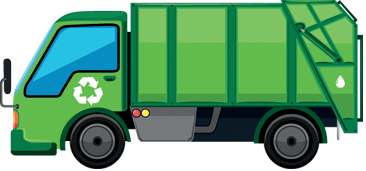Composting is an eco-friendly way to optimize the waste management and rubbish removal processes in your home. It helps you get rid of junk, but also reduce the overall amount of waste produced by your housed. Understanding the basic principles of composting will definitely help you manage the job better and achieve optimal results, which will be a good thing for you, your home and the planet as well.
- What is compost?
 Compost is organic matter that has gone through a process of recycling and turned into fertilizer and/or soil amendment. Compost can be made of leaves as well as food waste. The most basic way in which you can do that is to pile it in a heap and wait for the waste to turn into humus after a couple of weeks to a month’s time. There are several special techniques for making rich compost that involve regulation of the amount of water, carbon, nitrogen and air that are allowed into the compost itself.
Compost is organic matter that has gone through a process of recycling and turned into fertilizer and/or soil amendment. Compost can be made of leaves as well as food waste. The most basic way in which you can do that is to pile it in a heap and wait for the waste to turn into humus after a couple of weeks to a month’s time. There are several special techniques for making rich compost that involve regulation of the amount of water, carbon, nitrogen and air that are allowed into the compost itself.
- What can you compost?
There is a rather rich variety of items that you can put for compost. Those include mainly kitchen waste like spoiled food or leftovers, vegetables, fruits, leaves, branches, plants, eggshells, coffee grounds and filters, paper, and cardboard. Bread, dryer lint, chemically treated wood, used personal items, glass, glossy paper, and grease can also be composted, but the problem is that they are not as eco-friendly as the green materials. Either way, it is much better to compost them than to just throw them away in the garbage.
- Why compost?
There are several very good reasons why you should consider taking up composting. For starters, it is a very eco-friendly approach to waste management. The process reduces the amount of junk that is dumped on a daily basis on landfills and dumpsters. It significantly reduces the negative effects of junk on the environment. It optimizes the way food is being processed in your household, because it finds a viable purpose for food waste that you would otherwise simply throw away. Once the compost is made, you can use it as fertilizer for your garden. No matter whether you are growing vegetables or flowers, it would be much better to make the soil richer via compost, instead of the chemical substances that are usually to be found in commercially produced fertilizers. Last but not least, even though composting might seem a bit complex at first, once you get a grip on the process you are going to realize that it is not that hard at all to do it and contribute to the balance in the environment.
- How to get started?
The first thing to do is to build a compost bin to fill with the items needed for composting. You can put it in the backyard and start collecting junk in it. This will on one hand help you determine how much junk your household is producing, while at the same time you are going to make the whole process much more organized. Many local communities now have community compost bins where residents can collectively accumulate the compost. Check out if yours has such.

